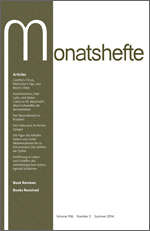|


|

View Online Edition
Subscribe Online
Activate Your Subscription
Sign up for email updates
Editorial Board
Back Issue TOC's
Advertising Rates
Artwork Guidelines
Index/Abstracts
Recommend Monatshefte
Submission Guidelines
Monatshefte 2017 Subscription Rates
Libraries & Institutions:
print & online $230
online only $198
Individuals:
print & online $90
online only $75
Non U.S. Postage (no postage charges for electronic only subscriptions)
Airmail: add $40/yr.
Canadian Subscribers: add 5% GST. |
Monatshefte
Volume 93, Number 3, Fall 2001 Table of Contents
Texts and Documents
Kerstin Gaddy
Interview with Brigitte Burmeister (Washington D.C., 15 April 2000)
This interview from April 2000 centers on two main topics. First, Brigitte Burmeister discusses the literary scene in East Germany around 1989, specifically the role of the Stasi in the literary circles and the role of herself and other authors in the reunification process. Secondly, she discusses her novel Unter dem Namen Norma. (KG) (In German)
Articles
Reinhold Grimm
The Ritual of Translation: Some Examples Chiefly from English and German Letters
Abstract:
After a brief introduction dealing with the translatability or ultimate intranslatability of texts by Walter de la Mare, Samuel Beckett, Günter Kunert, and Christian Morgenstern, the bulk of this article is devoted to a detailed investigation and comparison of various aspects of the English version (by H. T. Lowe-Porter) of Thomas Mann’s novel Joseph und seine Brüder; then, as a kind of supplement, there follows a cursory discussion of similar problems in the English version(s) of Goethe’s novel Die Leiden des jungen Werthers. As it turns out, even the very basics of the “ritual of translation” are in dire need of constant admonition, indeed exhortations. (RG)
Alexander Košenina
Friedrich Nicolai’s Satires on Philosophy
Abstract:
Friedrich Nicolai’s Satires Geschichte eines dicken Mannes (1794) and Leben und Meinungen des Sempronius Gundibert, eines deutschen Philosophen (1798) are as much neglected as his philosophical writings. But his entertaining literary polemics as well as his painstaking academic books and essays are merely two strategies in the same battle. In both areas, Nicolai attempted to fight as a popular philosopher and advocate of practical Enlightenment against darkness, incomprehensibility, and lack of usefulness which he recognized in the abstract philosophy of German Idealism. This article reconsiders Nicolai’s contribution to the Enlightenment, which has largely been ignored by a historiography which emphasizes the giants, both in philosophy and in literature. (AK)
Rudolf Drux
“Aussterben” als Innovation. “Die abgelebte moderne Gesellschaft” in den Dramen Georg Büchners
Abstract:
According to Büchner, modern society, where “the King and the Chambers rule” while “the people applaud and pay” (letter to the family, Dec. 1832), has outlived itself to the extent that it will self-destruct without external force. Georg Büchner exposes it in all his plays by reproducing its characteristic features: political measures intended to maintain the ruling order are denounced in equal fashion as philosophical views that declare it legitimate and an art that glosses over and provides consolation for a miserable reality. This society is characterized by the “entsetzlichste Langeweile” that results from the complete ossification of all intellectual life,—thus its own end is the only thing new this society can still produce, and this end is inevitable, at least if we follow Büchner’s description. (RD) (In German)
Gerrit-Jan Berendse
Schreiben als Köperverletzung: Zur Anthropologie des Terrors in Bernward Vespers Die Reise
Abstract:
In the context of Germany’s encounter with left-wing terrorism, the novel Die Reise (1977) by Bernward Vesper (1938–71) initiated a new discourse on politically motivated violence. The voyeuristic insights into the author’s inner feelings while confronted with “verbal terrorism” and the juxtaposition of anger, fear, and aggression offers an alternative rhetoric within the dualistic framework in which the ideological debates of the so-called German Autumn took place. Die Reise is a study of the author’s both hostile and tortured body, resulting—not solely metaphorically—in the author’s death. This article critically examines Vesper’s masochistic treatment of the body in conjunction with the one-dimensional representation of the terrorist’s body as a demon in the West German media, and the preoccupation with corporeality and self-mutilation in the arts in the 1970s. Vesper’s anthropology of terror finds its counterpart in the sadistic “politics of the body” (Michael Rutschky) which constructed the rationale for the violent actions of the first generation of the Red Army Faction. (G-JB) (In German)
Sabine Wilke
“Hätte er bleiben wollen, er hätte anders denken und fühlen lernen müssen”: Afrika geschildert aus Sicht der Weißen in Uwe Timms Morenga
Abstract:
At the beginning of the 1980s, a long overdue discussion concerning German colonial history came to the fore in the Federal Republic of Germany. The writer Uwe Timm took part, first with a volume of pictures and then with the novel Morenga. This article investigates how Timm represents Germany’s role in this novel through the fictionalized encounter between German colonists and Africans in Southwest Africa, which is known as Namibia today. Timm’s representation of everyday colonial life is informed by his reading of historical sources and studies which then are presented in dialogue with fictitious and pseudo-fictitious figures. Unfortunately, we find here only descriptions of African culture from the point of view of the European colonists, and thus the artificially created discourse of the colonized Africans, which Timm has sensed and criticized in the German public of the 1980s, is essentially not questioned even in this novel. (SW) (In German)
Review Article
Sabine Gross
Image and Text: Recent Research in Intermediality
Book Reviews
Note
Monatshefte / Max Kade Institute Directory of German Studies 2000
|




